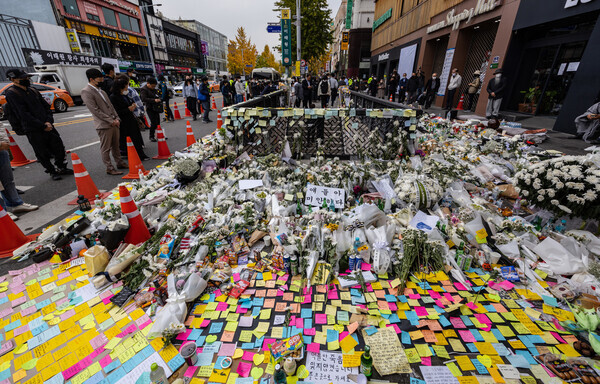hankyoreh
Links to other country sites 다른 나라 사이트 링크
[Column] A time for questioning, a time of excuses


A recently uncovered “policy reference” document by the Korean National Police Agency's intelligence bureau reveals the current point of view held by the ruling party, which is wary that responsibility for the Itaewon disaster will be pinned on the government.
The document cited references made by progressive groups, such as comparing the current situation to the poor response by the government during the Sewol ferry disaster and the government’s focus on wanting to influence public opinion in its favor. The document also stated that this could even lead to a movement calling for the administration to step down.
Lee Sang-min, minister of the interior and safety, referred to criticism regarding the absence of police forces at Itaewon as “agitating, political arguments” while Chung Jin-suk, interim leader of the ruling People Power Party, said that the time right after the Itaewon disaster was not a time for questioning or interrogations but for commemorating the deceased. Similarly, ruling party lawmaker Kweon Seong-dong said that “sadness should not be spread through partisan anger.”
All these statements are in line with denouncing the current fact-finding probe as a political dispute.
Although the whole country is grieving due to the Itaewon disaster, it is no exaggeration to say that, over the past five days, the Yoon Suk-yeol administration has shown the people nothing but excuses and attempts to distance itself from responsibility for the situation.
Even though 156 lives have been lost in the absence of the government, a major figure belonging to the ruling party has yet to utter the words "my responsibility" or “the government's responsibility.”
Immediately after the disaster, Lee Sang-min, head of the ministry in charge of disaster and safety, said that the lack of deployment of police and firefighters was not a problem. Meanwhile, although KNPA Commissioner General Yoon Hee-keun said he had dispatched many more police officers to the scene than in the past, he failed to disclose the fact that only about 30 officers of the police patrol unit were actually maintaining public order in the area.
Similarly, Park Hee-young, head of Yongsan District Office, who had been neglecting safety measures, said, “I did everything I could do in my position”, while Oh Se-hoon, mayor of Seoul, was met with public outrage when he said that identifying the cause of the incident came first.
At least these officials began apologizing one after another starting on Tuesday, but they only mentioned “heavy responsibility” and agreed that the actual responsibility would be revealed after the fact-finding investigation was completed.
The “apologies” of these officials seem to be calculated and preemptive measures aiming to reduce the impact of transcripts of calls to the 112 emergency police line that were recently released.
An individual close to the central administrative agency said, “We did not do [the apology] the way we wanted to,” implying that there may have been some kind of instruction given to them.
In addition, the government’s directive to label the Itaewon disaster as an “accident” and the victims as “the deceased” also raises doubts about whether the government is intentionally trying to lower the severity level of the disaster and water down the government’s responsibility in managing the situation.
The ruling party’s insistence that the public should “keep quiet” during the mourning period was undermined when calls made to 112, Korea’s emergency hotline, shortly before the Itaewon disaster, were released on Tuesday afternoon. It became clear that the police and municipal officials had been remiss in their actions both before and after the accident. That prompted the national police to set up a special investigation headquarters with the goal of determining the cause of the tragedy and to carry out major raids on the Seoul Metropolitan Police Agency and other offices.
On Thursday, the special team of auditors at the KNPA asked the special investigation headquarters to investigate the director of the 112 situation room and the chief of the Yongsan Police Station — the station responsible for the Itaewon area — for being slow to inform the government about what was happening. Yoon Hee-keun’s remark about an “unsatisfactory response on the ground” appears to be serving as a guideline.
But there are also concerns that working-level officials will be made scapegoats to shield higher-level officials from questions about why crowd control officers weren’t dispatched to an event that was expected to bring out 100,000 people, why requests for backup were ignored, and why the reporting system disintegrated.
That’s why it’s important for Yoon Suk-yeol to make a public apology. When the president doesn’t acknowledge responsibility, public officials feel obliged to dodge or shirk responsibility for fear they’ll be left holding the bag.
Above all, since it’s now clear that this tragedy was the result of human error, it’s only natural for the president to apologize as the person charged with protecting Koreans’ lives and safety. That’s needed to clear the way for a no-holds-barred investigation that could reach as far as the presidential office.
But following reports that a briefing on the 112 recordings enraged Yoon, the fact-finding investigation seems to be aimed at holding the police responsible, and working-level officials in particular. Despite vocal demands for Minister of Interior and Safety Lee Sang-min to be sacked, Yoon has been demonstrating his confidence in the minister by joining him at the joint memorial altar several days running. Members of the presidential office also seem to feel that apologizing would weaken Yoon’s position.
The final page of the KNPA’s policy reference document notes that “interest in the cause of an accident and government action tends to peak around two to four days afterward, and media coverage decreases after the government announces interim investigation findings or measures to prevent similar accidents from occurring in the future.” Perhaps the government had originally hoped that public interest would naturally wane following the seven-day mourning period.
The cause of this accident is obvious. The government, both at the central and local levels, failed to do what was needed, and innocent people lost their lives.
Yoon’s next steps should be making a sincere apology, disciplining the people responsible, and instituting measures to prevent another disaster. Saddened and angered, the people are watching.
Please direct questions or comments to [english@hani.co.kr]

Editorial・opinion
![[Column] Life on our Trisolaris [Column] Life on our Trisolaris](https://flexible.img.hani.co.kr/flexible/normal/500/300/imgdb/original/2024/0505/4817148682278544.jpg) [Column] Life on our Trisolaris
[Column] Life on our Trisolaris![[Editorial] Penalties for airing allegations against Korea’s first lady endanger free press [Editorial] Penalties for airing allegations against Korea’s first lady endanger free press](https://flexible.img.hani.co.kr/flexible/normal/500/300/imgdb/original/2024/0502/1817146398095106.jpg) [Editorial] Penalties for airing allegations against Korea’s first lady endanger free press
[Editorial] Penalties for airing allegations against Korea’s first lady endanger free press- [Editorial] Yoon must halt procurement of SM-3 interceptor missiles
- [Guest essay] Maybe Korea’s rapid population decline is an opportunity, not a crisis
- [Column] Can Yoon steer diplomacy with Russia, China back on track?
- [Column] Season 2 of special prosecutor probe may be coming to Korea soon
- [Column] Park Geun-hye déjà vu in Yoon Suk-yeol
- [Editorial] New weight of N. Korea’s nuclear threats makes dialogue all the more urgent
- [Guest essay] The real reason Korea’s new right wants to dub Rhee a founding father
- [Column] ‘Choson’: Is it time we start referring to N. Korea in its own terms?
Most viewed articles
- 1New sex-ed guidelines forbid teaching about homosexuality
- 2OECD upgrades Korea’s growth forecast from 2.2% to 2.6%
- 360% of young Koreans see no need to have kids after marriage
- 4[Column] Life on our Trisolaris
- 5Months and months of overdue wages are pushing migrant workers in Korea into debt
- 6Korean government’s compromise plan for medical reform swiftly rejected by doctors
- 7[Guest essay] Maybe Korea’s rapid population decline is an opportunity, not a crisis
- 8S. Korea discusses participation in defense development with AUKUS alliance
- 9Presidential office warns of veto in response to opposition passing special counsel probe act
- 10Inside the law for a special counsel probe over a Korean Marine’s death